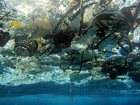U.S. officials on Thursday turned over to the Mongolian government enough 80 million-year-old dinosaur skeletons to stock a museum, including two relics of a kind of dinosaur that a prosecutor said "memorably stampeded" in a Hollywood movie.
U.S. Attorney Preet Bharara said the fossilized remains of more than 18 dinosaurs recovered by federal authorities were transferred after a ceremony attended by Mongolia's ambassador to the United Nations.
 Full Story
Full Story
A fugitive treasure hunter's company has lost its bid to stop deep-sea explorers from bringing up gold and other artifacts from a ship that sank off the South Carolina coast in 1857 and has been the subject of legal fights for nearly 30 years.
In a ruling Wednesday, federal Judge Rebecca Beach Smith declared that an Ohio company, Recovery Limited Partnership, has the salvage rights to the ship, the SS Central America.
 Full Story
Full Story
Some 558 rhino have been killed in South Africa already this year, setting the country on course for a gruesome new record number of poaching deaths, wildlife officials said Thursday.
Despite stepped-up efforts to curb the scourge, the number of animals killed is around 100 higher than at the same point in 2013, a year which saw a record 1,004 deaths.
 Full Story
Full Story
Australians were treated to a spectacular light show after a flaming object, believed to be space junk from a Russian booster rocket, streaked across the night sky and lit up social media.
People flocked to Twitter or called radio stations to describe the "amazing" fireball that crossed Australia's eastern states, particularly Melbourne, in a south-west to north-east direction late Thursday.
 Full Story
Full Story
A warming planet is likely to bring more hot days, more sweaty people and more dehydration -- a key risk factor for a surge in kidney stones, researchers said Thursday.
Already, the study in the journal Environmental Health Perspectives found a link between hot days and kidney stones in 60,000 patients whose medical records were studied in Atlanta, Chicago, Dallas, Los Angeles and Philadelphia.
 Full Story
Full Story
With a long, slimy body and beady eyes, North America's largest salamander wouldn't top any cutest animal lists. The hellbender's alien appearance and mysterious ways have earned the big amphibian a bad reputation and unflattering nicknames ranging from snot otter to devil dog.
But hellbenders, which can grow two or more feet long, are facing troubles bigger than an image problem. The aquatic creatures found only in swift-flowing, rocky rivers and streams are disappearing from large parts of the 16 states they inhabit.
 Full Story
Full Story
Duke University professor Kathleen Pryer has received her share of grant money. But for her newest project, she's getting help from a retired nurse in Canada and a 17-year-old in Arkansas.
It's her first foray into the modern-day world of crowdfunding, the practice of using the Internet to raise relatively small amounts of money from a lot of people to finance a project. It's quite a departure from the normal sources of funding for scientific research, chiefly industry, government and philanthropies.
 Full Story
Full Story
Australian authorities struggled to rescue a beached baby whale Wednesday and were forced to suspend the operation as fading light hampered efforts to return it to sea.
The whale, reportedly a two-year-old humpback, washed up on Palm Beach on the popular Gold Coast late Tuesday, with rescuers working for hours to try and free it.
 Full Story
Full Story
More than two dozen scientific institutes, in unprecedented advice to world leaders, on Tuesday urged major economies to unleash an energy revolution for slashing carbon emissions to safer levels by 2050.
In a report issued ahead of the September 23 world climate summit, they also warned time was short for meeting the UN's global-warming target but the goal must not be scrapped.
 Full Story
Full Story
Dutch student Boyan Slat is only 19 years old, but he already has 100 people working on his revolutionary plan to scoop thousands of tonnes of damaging plastics from the oceans.
The world's "plastic soup", much of it swirling around in five main gyres or rotating oceanic currents, costs billions of euros (dollars) to the fishing and tourism sectors every year.
 Full Story
Full Story



